Benson & Clegg flannel suit: Review

This is the kind of suit that makes you glad you're wearing a suit.
The kind you look forward to wearing, as a change to the floppy casual home stuff you've been in too much recently.
Why? Because of the structure, the shoulder and to a lesser extent, the drape. They combine to create something quite transformative.
Soft tailoring - Neapolitan in particular - has become understandably popular in the past 10 years. To the point where it’s almost the default style among menswear shops.
But I’ll be interested to see whether strong tailoring makes something of a comeback in the future. After all, one of the advantages of a Neapolitan suit was that it was lighter, more casual, easier to wear all week.
But with the suit looking less and less like default business clothing, I think people will be wearing them more for occasions - when they want to really feel its possibilities.
This is that kind of suit.
To catch-up, briefly. This suit was cut for me by Oli Cross (above), now at Benson & Clegg in London’s Piccadilly Arcade. The team there has been revamped recently - as covered in our previous article - but there is also plenty of tailoring history to build on.
Oli trained under Malcolm Plews, and his cutting style is typically English and strong (though he is self-aware enough to be playing with lighter makes, set-in sleeves and other modern tendencies).
This suit, therefore, is classic English in its make: canvas, horsehair and domette in the front; a decent pad in the shoulder. It is not, however, as padded or structured as the likes of Huntsman or Sexton.
Oli would also not call himself a drape cutter, but he’s happy to cut extra room in the chest and back, and that’s what we went with. Long-time readers will know that’s a style I like, for the way it flatters the upper body, and Oli executed it well.
I think both the posed and natural images below illustrate the impression of size that gives to the upper body.
Oli also naturally cuts quite a big sleeve, which you can really see in the image above. Look how large the top half is, and yet it still narrows elegantly to the cuff.
I’ve never understood why any tailor cuts a narrow sleeve. It’s just not flattering to look like you have skinny arms. I can understand the motivation for a waist that’s cut a little too slim, but not a sleeve.
Unless the idea is that your biceps bulge when you bend the sleeve, like they’re trying to burst out. But if that’s the look you want, tailoring is really not the vehicle for it: you’re taking sharp, elegant lines (the shoulder, the lapel) and then deliberately putting a lump in the middle. There’s just no point - you’d be better off in at T-shirt.
With a sleeve as big as the one here, there’s always more chance of a little messiness at the back. But it's easy to be a little trimmer, without resorting to sausage arms.
Returning to Oli’s cut. This is partly what he would do naturally, and partly what I requested.
We had slightly extended shoulders (6¾ inches along the shoulder seam); a slightly lower buttoning point (waist button 18¾ from the same seam); and a moderate lapel (3¾). All of which you can compare to other tailors in the Style Breakdown series, for context.
In every case, I was not asking Oli to cut a certain style or certain proportions, but rather responding to his questions - did I want it a little bit bigger, or a bit smaller; a touch wider, or a touch narrower.
This is a good way to make sure you’re very much within a cutter’s natural style, and therefore comfort zone - a general practice I’ve recommended previously.
The fit of the suit felt good - solid - from the start. The balance was right, the fronts clean, no collapsing on the right under my lower right shoulder.
In fact, I’d say this is often a key mark of a higher quality tailor. The majority of the time, when I’ve had things made by a Savile Row house or bigger names in Italy and France, there has been this solid initial fit - this professionalism, perhaps.
Smaller tailors or perhaps those from Asia working at a slightly lower quality level, can get there in the end (eg Anthology) but there isn’t often quite the same strong start.
There is some drape in the back of this suit, and around my shoulder blades, which others would want cleaning up - but it's exaggerated by the image above. The slightly messiness at the back of the sleeve I’ve commented on already.
The only real issue we had fit-wise was the pockets on the trousers, which are gaping a little.
This is an area that’s tricky on me, because I have a proportionally large seat and like a trim trouser elsewhere. But still, it’s something others have dealt with better.
We’re going to see how these settle down, particularly given I use the pockets quite heavily, and look at them again in a few weeks.
The make of the suit is very good - it’s what you should expect for a top-end Savile Row suit, and frankly for any suit costing over £4,000 (this cost £4,400, including VAT).
The buttonholes are precise, the jetts neatly done, the lining nicely hand-felled. It’s perhaps a pity that the fabric around the inbreast pocket is cut halfway along the opening, but it’s a minor point.
The only issue we had here was the length of the sleeves, which had to be adjusted a few times because of some silly miscommunication. But I don’t draw many conclusions from that, given the consistency of the service elsewhere.
The cloth is a wonderful, a heavy flannel from Caccioppoli (570307, 17oz). I love deep, dark greens like this, but have found them tricky to source - most are too light or too strong.
This green is perfect, and goes really nicely with rich, autumnal colours like oranges, purples and dark brown like my shoes here. But it also works well with brighter pops of colour, like the pink of this silk handkerchief (from Rubinacci).
Those shoes were my first bespoke pair, by the way, from Cleverley, and are now 10 years old. They deserve an article in the ‘How great things age’ series sometime soon.
And the tie is great, but is actually polyester from Tie Rack. Its significance is emotional, as my grandfather wore it to my wedding (which we covered on PS at the time, here).
Sadly, he passed away recently, and this will be one of the things I remember him by.
Anyway. Returning to the drier world of tailoring, I would just conclude by saying that Oli’s work was impressive, and on this evidence Benson & Clegg deserve to be considered alongside any of the better-known houses on Savile Row.
It is the kind of suit I look forward to wearing. When this newest lockdown finally ends.
Benson & Clegg bespoke starts at £4,400 including VAT. They also offer MTO and MTM, which we won’t cover, and bespoke cut here but made in China from £2,650.
Photography: Alex Natt @adnatt















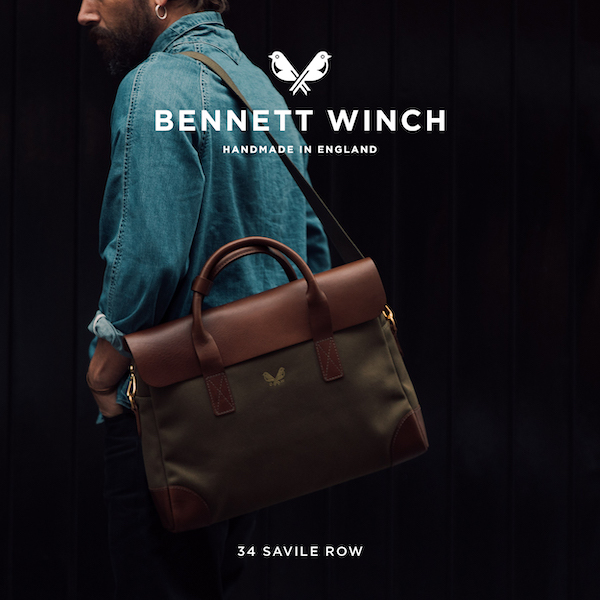




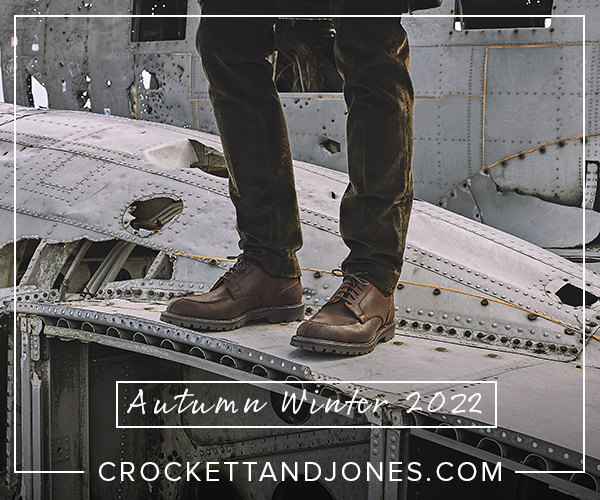


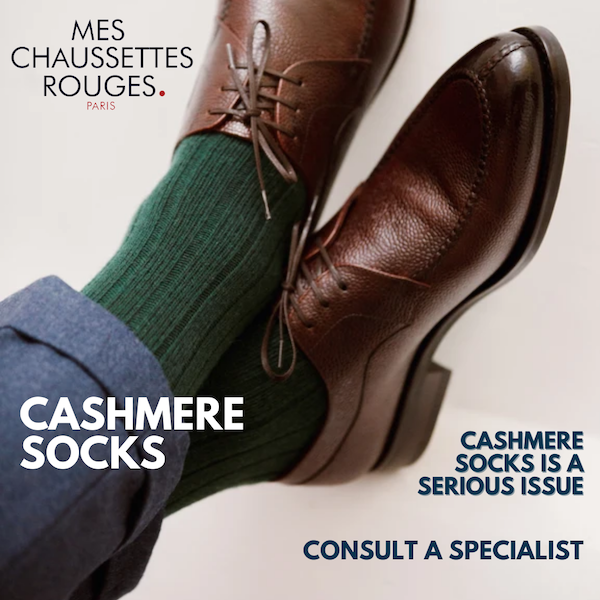










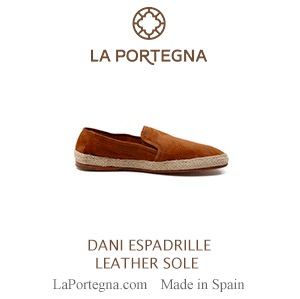
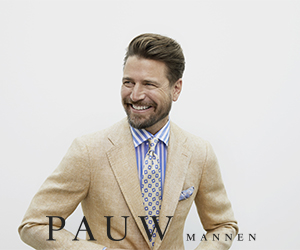



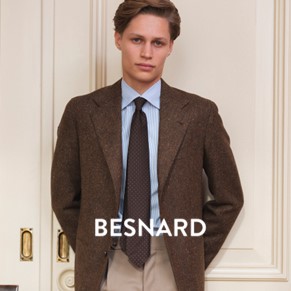
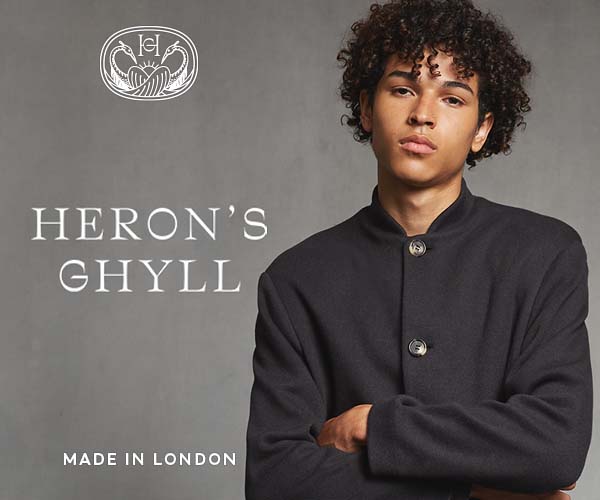

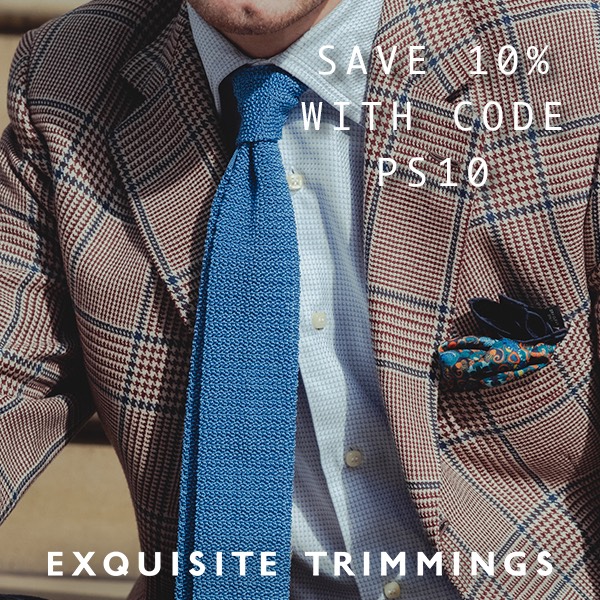
This is a very nice suit, Simon! The cloth looks superb, do you know if Caccioppoli got it from an Italian or English mill?
I don’t I’m afraid. But I wouldn’t worry about the density of it, or over-finishing, if that’s your concern. It feels great in both regards
This is a post that I was waiting to see for some time. That is a superb suit. I have Benson & Clegg on my tailors shortlist for a first foray into bespoke, along with Anderson & Sheppard in particular, Stephen Hitchcock, Dege and Skinner and Tom Mahon. I want to be measured up by a good cutter that knows his stuff.
Can you recommend any of these tailoring firms?
Many thanks
Lindsay
I’d recommend all of them save Tom, just because I’ve never tried him myself. But obviously there are some style, cost and experience differences there. How do you feel about those?
A lovely note to end the piece on, Simon. The suit itself looks perfect for occasional use. It would be interesting to read a comparison of the full bespoke offering shown here with the China-made offering they provide, unless you feel the points of differentiation would be negligible.
I think I’m unlikely to try that soon, but I will be trying something similar from Sexton, if that’s helpful
Are these China made offerings expected to be similar in standard / price to W&S?
Yes, roughly, though each does take a slightly different approach – for example, Sexton doesn’t take the option of hand-padding, where some others do
Really looking forward to Sexton offshore bespoke review!
I had a really negative experience with the Sexton offshore bespoke. The measurements were way out; the trousers were four or five inches too big at the waist, for example. They were taken in, but remain a poor fit. The jacket was too roomy at the front and the only attempt at adjustment was to move the button, resulting in a degree of overlap that looks odd. As a result, the suit has never been worn. A very disappointing experience and in complete contrast to my experience of W&S, which has been uniformly excellent over a number of commissions and is significantly cheaper.
Good to know, thanks
It’s disappointing to hear about off shore bespoke and clearly it’s pitfalls. I wonder if it’s not preferable to find an honest competent Tailor in the provinces and strike up a successful working relationship at home after all it’s the quality of the work and not the label that counts.
Extremely disappointing to hear this experience. Surprised that the measurements were so off since they are supposed to be done by Sexton himself or Dominic. And even more surprising that you were not accommodated with more than just superficial alterations for such a reputable tailor. Though would have been easier to make adjustments if had a basted fitting instead and skipped forward fitting, as in Huntsman 100 (reverse for Sexton offshore bespoke)…makes me rethink trying it. Wonder when Simon’s experience will be completed to perhaps convince me to try it…
Very nice suit Simon.This is why we wear bespoke suits.They look so good.
Even though you consider it more formal than it’s Neapolitan counterpart I would still wear it sometimes with a fine roll neck sweater.Would you?
Yes I would, though that would be a fairly striking look – certainly an event/evening look
Never understood how you could wear that and not boil
Thanks for your response to my comment on my shortlist of various tailoring establishments above.
I would be looking for a highly experienced cutter and I would put quality and fit first. A roomier drape fit ideally as I don’t like a tight fit. Cost is secondary for me but important nonetheless.
I think you’d get that experience from all of these, and the quality. But less of the drape with Dege
The real problem with A and S or Dege as a new customer is that you are likely to get an apprentice cutter or the junior one. Sure the master tailor should supervise but just be aware of this prior to rocking up.
It would be good to know if that’s based on personal experience Hak?
Yes, hence why I moved to C and M where you get the head honco cutting and managing your suit.
Thanks. I’m not sure my experiences or what I’ve seen lined up with that, and obviously Joe isn’t cutting everything either, so good to hear
Lovely suit. One of your better ones for sure. 1 suggestion and 1 question.
First, the full-body shots of the suit where you are standing straight–not the ones where you are posing more naturally–would look much better if the camera were a bit higher up, closer to shoulder or even eye level. When you have it lower down, your midsection will look bigger and your shoulders smaller. This is partly a matter of perspective and partly a matter of how the lens distorts the image.
Second, is the whole structured thing easy to get right in rtw? I have seen plenty of Neapolitan rtw that fits well, but not much that is more structured.
Thanks.
On the photos, wouldn’t that distort the lower parts of the suit, if the shot were taken from eye level? At least this way any distortion is even to the top and bottom. That’s how we shot the suits for the Style Breakdown series for that reason.
Structured is perhaps harder to get right, even though in theory it can cover a multitude of sins. Certainly a drape style is hard to get right in RTW.
It could sure, but we are used to seeing other people at eye level. When I look at you normally, my eyes are not at the level of your waist. Accordingly, things will look more normal with the camera higher up.
When I judge how a suit looks on someone, I judge from a normal eye level. This is how we are accustomed to seeing jackets, pants, etc. And even when we do see someone from lower down in real life, our eyes are better at making adjustments and “correcting” what we see.
You can always try both and see how they turn out.
Another alternative is to take the pictures from farther back without zoom and then crop them. The images won’t be as high-res, but you won’t get the lens distortion.
Admittedly, I am no expert in photography. My training is as a painter and when painters use photographs they have to be especially sensitive to these photographic distortions or else the painting will look off (these distortions look less natural in a painting).
Again, nice review (as always) and nice suit. You have done a good job of changing my attitude toward structured tailoring.
Thanks EL, good to know.
We did try both options withe studio series, and this seems the most realistic.
What a suit! This one speaks to me, for some reason, Simon. And the cloth is one I would opt for myself.
I’d be very interested to hear about how the trousers settle down. Are there generally any tricks that cut before done during the making stage to ward off this billowing? Are straight pockets any better slanting? Perhaps making them longer (the opening larger)?
Lovely article Simon. My favourite ‘genre’.
Thanks Luke.
There are types of pockets that avoid this issue – ones cut just into the cloth, as I’ve had with Sexton in the past. But those are wont to gape instead.
And frogmouth pockets too.
But this is really a cutting issue otherwise, which is not easy to analyse. Perhaps some more fullness is needed in the front of the trouser, perhaps the back, perhaps it’s balance. But I’m certainly not qualified to say
For some reason, the trousers I have in flannel settle down quite good. I think the fabric’s weight and structure are really prone to adjust more to the wearer and much easier than the more worsted or crisp cloths. You will need to press everything more often of course
Interesting point up-front about the Naples style. Henry Poole are emailing their longstanding clients saying they’re starting to offer a style that is a little softer / less ‘suit of armour’ than one might generally expect of them. I’m sorely tempted to try it; what do you reckon? Good idea or should one stick to purely to what the house is best known for…?
From what I understood from a quick discussion with Simon on this, the cut is the same as other Poole, it’s just the structure that’s a little lighter. So it won’t make much different to the style, just the feel. And certainly it won’t be similar to any other makers that use a softer make, like the various Italians.
Simon,
The comment on your grandfather’s tie was very touching and heartfelt.
Would you recommend Henry Poole as a bespoke tailor? You do not mention them often. How does their house style compare to others on the Row?
Thank you.
Yes I would. Perhaps have a look at my articles on the suit they made for me, and then the piece on them in the Style Breakdown series? That would give you the best sense of the style
Hello Simon,
Your tie looks very elegant with this lovely suit.
Thanks Daniel
Is it worsted wool flannel ?
No, it’s woollen flannel. The majority are, and I’d always refer to that as flannel, but specify if something were a worsted flannel
Love the suit, cut and colour. Just not so sure about the sleeves. Perhaps the photos are distorting them a little, but they look too full.
Otherwise, great lines on the suit. Great article. I miss wearing a suit for work.
Subjective, I know.
Sorry to hear about your grandfather Simon. I agree that certain items can bring back fond memories regardless of the intrinsic quality of such an item.
The suit looks great. I also have a prominent seat and I’ve had problems with side pockets opening slightly with flat front trousers. Even if it looks ok when they are new the issue does seem to develop over time as the trousers are worn. I now usually go with one pleat as it does resolve the problem. Perhaps that’s a solution if you don’t dislike pleats.
Thanks. Pleats never seemed to have solved it for me, despite a few attempts with different tailors
Interesting, perhaps it shows that there are no universal solutions given the wide variety of body types as well as ways of wearing clothes.
This is when brace trousers make a huge difference – the waist can be looser the front of the trouser marginally fuller and the pockets won’t gape.
Sorry to hear about your grandfather Simon. Fabulous looking suit by the way.
Best regards, Pyc
I forgot to ask what is your opinion about a jacket like this one where the front quarters are almost closed unlike say Steven Hitckcock’s jacket. Does it matter much? Perhaps it makes it slightly more formal ?
Yes, it makes it more formal. Beyond that it’s more a question of which style you like personally
I don’t get the value proposition. You can go to Whitcomb and Shaftesbury and get the same ‘Saville Row level’ suit for £2.5K, using their ‘classic bespoke’ service. Why spend the extra £2K with this chap?
A few things Graham. First the styles are not the same, though they’re not far apart in the grand scheme of things. And some people prefer not to make in India, despite the cost saving. Some clients use the Whitcomb Savile Row service for the same reason, even though the cutting is exactly the same
Dear Simon,
Graham Browne seems to be twice less expensive than Whitcomb (the made in India line) and Benson (the made in China line) for a bespoke service ? Graham Browne still makes their suits in their premises in the City ? All the best. James
They do James, but the quality is not the same. I’ve written a lot about Graham Browne, though not recently. Perhaps have a look at those old posts.
Wonderful suit Simon, and wonderful timing to bring these beautiful garments back into the limelight when so much casual clothing surrounds us on an increasing basis. You may certainly have a point there when talking about how suits are being worn more for occasions and because people enjoy wearing them as a departure from the casual everyday.
Congratulations to the cutter and to you for such a lovely combination, (the tie is fabulous, I have a similar polyester one that I wear for sentimental reasons and totally get your vibe there)
The fronts on this jacket seem a little less cut away than your Whitcomb suit which has a similar drape look (I recently purchased your book) would you say that this is down to the cutters style?
Thank you.
Yes I would, though with Oli he is also quite flexible so you could tweak that if you wanted
No button harmony with pocket?
Do you mean the hip pocket is a little higher than the second button of the jacket?
Yes sir.
Ethan M. Wong introduced this term I believe: https://streetxsprezza.wordpress.com/2020/08/23/the-bottom-button-pocket-line-harmony/. I never noticed it until he pointed it out, but now I can’t unsee it and I do find it somewhat off-putting to see the bottom button beneath the pocket. Do you have an opinion about it?
I think it’s a pretty small detail to be honest – compared to everything else on a jacket from the shoulders to the lapels to the suppression to the opening. I can see why someone might prefer it, but it’s not that important. And, it’s not necessarily the case that a pocket is best lined up with that second button. It means that pocket is closer to the bottom of the jacket, which can look equally odd. Those vintage images Ethan uses are great, but they don’t generally have that issue because the buttoning point is much higher.
In the end, the buttoning point of the jacket is more important, and then it’s a case of where you feel the pocket best sits to create balance. And that’s always a little subjective.
Simon, that’s correct. is that a style option you prefer or is it from the cutter?
From the cutter. A result, I think, of me moving the waist button down slightly, and so the second button as well
Wonderful suit Simon. Also a great look on you. I have the same issue with my backside so I feel you there. I’m having pants let out at the hip as we speak for the same reason. Nice touch with the tie story as well.
Very good looking suit, Simon!
What do you think is causing the issue with the pockets on the trousers? I had some trousers cut by Graham Browne that are suffering from exactly the same issue. I took them back to be fixed but all they did was close the pockets a bit, i.e. make the opening smaller which did nothing to fix the issue.
As noted above in the comments Teo, it’s beyond me being a fairly technical cutting point
I think you’ve covered this in an article before, but I cannot seem to find it. What are the minor points around the inbreast pockets? I still haven’t quite grasped the nuance of this detail. I see where the cloth is cut along the pocket opening, but not sure what the alternative is or what the benefits may be of the alternative. Thanks.
I’ve never done a detailed post on it. Just this one on the outer pockets.
The alternative is to use enough cloth to not cut anywhere along the pocket there. It looks better, cleaner. Some tailors also just cut the pocket into the lining, with no cloth from the facing running out around the pocket. And that is weaker in the long term. See Poole example here.
Thanks, I’ll check it out
Lovely suit Simon. I can see you like flannel suits but what do you think of worsted cloth with a milled finish?It seems to have the look of flannel with it’s soft,fluffy surface but is a little harder wearing and perhaps holds a crease better.
I’ve never especially liked these versions of flannel – the idea appeals, but the actual cloth seems to lose too much of the appeal of flannel. It’s not just the surface texture after all.
Then again, I’ve never had anything made up in one of them, so I might well be wrong and they feel the same in a finished product.
Probably, Simon, you were the only man wearing a suit in Piccadilly today – presume you’re standing outside the Royal Academy?
Yep, though I did spot at least a handful of others.
My condolences for your loss, Simon. May his memory be a blessing
Thank you Hugh, a lovely sentiment
+ 1
Some years ago you had a lovely interview with him about the way one wore suits in the City, if I remember right. He’ll always be a part of you.
Absolutely
Mr Plews surely only wears that heavy suit jacket when photographed?
Simon – beautiful suit. Re the trouser’s buttoning/closing mechanism with no visible button ( visible button on the right are usually with most ready to wear trousers) is the depicted example for this Benson and Clegg suit typical for most Savile Row tailors?
By the way I have bought many sets of gilt blazer buttons from Benson and Clegg of late – brilliant quality – a step above Holland and Sherry’s buttons I feel. Are there any other gilt/blazer button retailers of equal or greater quality/standing?
Lastly re the coin pocket usually cut in to the outside right hand side of trousers what do you feel are the ideal dimensions for easy access and retrieval of coins? I feel 8cm wide and 6.5cms deep works beautifully.
Thank You in advance.
Hi there,
This trouser fastening mechanism, with a hook at the end of the extended waistband rather than a button, is typical for most Savile Row tailors, yes. It is rather cleaner and perhaps therefore smarter.
On gilt buttons, I’m afraid I’ve never sourced new ones, just some vintage ones years ago for my Gieves pea coat.
On the coin pocket, I think it depends on the length of your fingers. I think you need to be able to get a finger in there, and then scoop out a coin etc. So it needs to be a little shallower than the length of your finger. Most are made too deep.
S
Lovely suit, and the front is very original indeed. One thing that to me though is that the buttons could be just a bit higher from the end of the sleeve. Its always a delicate balance, but they seem a bit low, like perhaps an alteration was done. Not intending to be negative, but it caught my eye. Enjoy and wear in health.
Thanks Peter. They are perhaps a tiny bit closer than you would cut by default, but still within the range of normal and I’m fine with. But thanks for bringing it up
Would you consider this fabric for an odd trouser?
Yes – as mentioned in the piece, I already have a pair in it
Hi Simon
Wonderful suit. Regarding the cut and style, do you believe this would suit a slimmer/smaller frame? At 50kg I struggle with fit, though I have only experience in RTW/MTM but due to my frame I am now only considering bespoke options.
Regarding the tie – an important reminder of the deeper value of clothing. Slight tangent on ties any thoughts on recent FT article ‘Is this the end of the tie’?
Rafael
Yes I think it would. I think the drape cut is particularly helpful on smaller frames, in giving them a little extra in the body.
I haven’t seen that FT article, but it does feel like it’s not anything surprising!
Hi Simon – but for smaller frames, wouldn’t a drape cut make a short guy look shorter, since it adds visual weight to the top of your body?
Perhaps a tiny bit, but you could be pretty subtle with the drape. The effect isn’t as bad on a shorter guy as wide padded shoulders
Having read your tailoring guides and flattering the tall/short article, which English/ Italian tailors would recommend whose style would best favor the shorter/lean guy with smaller shoulders? Thanks
I would have thought an English cutter, but not extreme. So perhaps someone like Henry Poole, Anderson & Sheppard – padding, but nothing too big and wide
Nice to see a suit post. On the subject of in-breast pockets, cutting the pocket opening as an extension of the facing does look neat but can be quite wasteful of cloth depending on the lay. Better in that case to join a piece as here (as long as you’re not being charged for cloth as though it hasn’t been joined, but how can you tell?). Pockets sewn directly into the lining are common in RTW and, as you say Simon, weaker but in high end tailoring where it looks as though this has been done it isn’t necessarily the case as Jeffery Diduch demonstrates in this deconstruction of a Huntsman suit. https://tuttofattoamano.blogspot.com/2009/12/huntsman-ripped-and-smoothed-part-two.html
Hi Ian,
Thanks. Yes of course you’re right, extending the facing will use rather more cloth, though perhaps that’s what you should expect from luxury tailoring of this sort.
And nice point on the pockets that appear to be sewn into the lining, but are not. I don’t think this is the case with mine from what I recall, but I’ll dig them out and have a feel.
Thanks for bringing it up
I am sorry for the loss of your father, Simon however it is nice that you have an article of clothing to remember him by. My father was not intrigued with tailoring like I am so I do not have any such items from him to wear however he did have this fleece vest I remember him wearing when he was ill so after he passed, I took it and remember him that way.
That is a lovely suit. The green colour is marvellous and the fit is wonderful.
Thank you Jake, though it was my grandfather, not my father. My father is fortunately still fit, active, happy and hilarious.
Hi Simon- lovely suit- the color is superb. I love the buttons on it. Can you share some of your thinking in choosing them? Thank you,
Sure Jay.
On most suits I use matte, unpolished horn – it’s more traditional in English bespoke and different from RTW.
I use dark brown because most of the time I wear brown shoes, and in a dark colour without too much colour variation, it can still go with black shoes if needed too.
Does that answer your questions?
Thank you Simon. I had not considered the connecting the color to the shoe, so that is something new I shall use. I always learn something when reading your columns, and it’s very much appreciated.
A proper garment. I read you often and I really appreciate your meticulousness. I would like to address a question to you: do you really consider turn-ups on flat front trousers to be appropriate? Your opinion will be much appreciated.
Yes Luca, I do. I don’t see a problem with them, on tailored trousers or indeed on chinos or chinos (both of which would also be flat-fronted).
The tradition of pleats with turn-ups is drawn on a rather particular point in history, and I think rather ignores how widely this style has been worn since, particularly in Italy.
Indeed, nothing like getting properly suited and booted. And nice to see you returning to classic tailoring and suits, I was worried that you were veering too deeply into ‘casualwear’ territory!
Love everything about this suit.
Having followed your blog for a long time, I do think it’s a little bit negligent not to have commissioned anything from Andrew Ramroop at Maurice Sedwell. His absence is conspicuous.
Thanks, but to be honest his style has never appealed to me. And I disagree it’s absence is conspicuous, given I can’t remember anyone else ever having brought it up
Well a quick search shows that at least one other reader has commented on it. Besides, I think it’s important to give exposure to non-white cutters as well. If nothing else, it’ll encourage more people from diverse backgrounds to get involved in the trade.
King Regards
Thanks, yes one person has mentioned it before.
I absolutely agree, and I will certainly highlight non-white cutters and indeed brands – though largely when they justify inclusion on other grounds. As every non-white person I’ve spoken to in the industry has told me they would wish it to be.
I would have thought Ramroop merits inclusion on “other grounds”. His work is reputed to be some of the best on the row.
It is very good, but I personally need to find the style attractive as well. Otherwise there just really isn’t enough of a difference between that and the dozens of other tailors covered.
It never occurred to me to make a request but I’d have liked to see Maurice Sedwell covered too (if only because many years ago a tailor from a different house on the row told me that he thought Maurice Sedwell construction was the best) but calling it negligent seems a bit dramatic! There are so many other good tailors not covered yet and it is almost impossible to cover everyone.
That said, I thought covering David Taube scratched the itch to an extent since he trained at Maurice Sedwell?
Thanks MB, I’ll add that as another vote.
I think Davide is very much his own person, as a craftsman and particularly a stylist. Sedwell’s style in particular has never attracted me much.
Apologies, I didn’t mean to suggest otherwise with regards to Davide.
The compliments given to MS that made me curious focused on the process and came many years ago (indeed, I think it was when Davide worked there as a cutter). I’d assumed that this had influenced Davide on any changes he made when he became head cutter at Gieves.
I suspect if I’d ordered anything from MS then I’d have asked for a less stylised version of their work as most of my tailoring is for business meetings… but then that’s equally true of many other tailors (e.g. C&M or Edward Sexton). These days I am more interested in the house style of a tailor than I am the small (if impressive) details of construction between good tailoring houses, even if I enjoy reading about them!
Looks very nice, although admittedly I’m surprised by the issues at the crotch balance and shoulders. I would think these would have been easier spotted in a basted or muslin fitting, and I hope you assertion that lighting exaggerates these issues is true. However, these are relatively simple issues to fix from a patternmakers point of view. I hope that these are adjusted in subsequent suits. Seems to me that your left hip is lower, as is your right shoulder, and some pressing around the blades is required to mold the back more properly to you. Perhaps a shorter backstrap for your posture and better sloping of the shoulders would benefit you.
You mention Asian makers, like Anthology, who I have seen produce much cleaner backs and trousers than English tailors. I wonder if professionalism and quality are deteriorating on the row.
Michael, I’m sorry but I really find it odd how people can question such things not being seen, let alone dealt with, in a suit made by good Savile Row cutter that the person hasn’t even seen.
Certainly, you can comment on potential issues and ask questions, but asserting that they exist in person and asserting solutions is unrealistic. As I’ve said many times before, this is always backed up by my experience when cutters see a suit in person, having only seen it online before.
And the cleanliness of the back is of course partly a question of comfort and style, rather than being just correct or not.
One aspect which makes the jacket look so nice is the generous, long lapel. It especially suits your height Simon.
Would Benson & Clegg be able to achieve this same aesthetic though if you were shorter (say 5’5″)?
Well, the lapel itself would be shorter, but it would be the same proportions of your body – so it wouldn’t look quite the same, but it would still have the same beneficial look and effect in comparison to other suits
If one is shorter, is it more aesthetic to have a higher lapel, like an Edwardian look? Or a lapel with a lower buttoning point on the torso such as this? Or something in the middle…?
On another note but related, what specific style points/garments do you personally think look good on shorter people?
Generally you want balance, nothing too extreme, but edging towards a higher buttoning point and open fronts that highlights a long leg. But balance really is the key driver.
On the general point, have you read this post in our Suit Style series? Perhaps have a read of that and its comments, and ask any questions you have there?
I read the comments from Hak in this post and I believe that he has raised an important point regarding the cutter that will be assigned to your commission with the tailoring House that you choose.
He mentioned A&S and Dege. These are at the top of my short list for my first venture into bespoke.
The point I’m raising here is, Can I request to be measured up by a Senior Cutter or even the Head Cutter as eg. C&M. I think Steven Hitchcock measures each client himself. Also Whitcombe & Shaftesbury use senior cutters. Any others? I would be interested to know more about this as in my opinion, when one pays in the thousands of pounds for bespoke, one should be allowed a say in their choice of cutter.
Thanks
Lindsay
Hi Lindsay,
I can completely understand why you would feel that way, but I think it’s worth saying in my experience, this has never made a difference. Every house of a size to have multiple cutters has a system where different cutters do different parts of the process, and work closely together. If you want to guarantee this, go for a one-man band like Steven Hitchcock. But don’t ask for that at a larger house. It’s a small thing and potentially a little insulting.
Thanks Simon for your reply to my comment. I certainly do not wish to cause insult in any tailoring establishment in choosing who my cutter will be. Thanks for pointing that out. I quite agree.
No worries. If anything I think it’s perhaps symptomatic of worrying a little too much about those details you can’t control, as well, if that makes sense.
Dear Simon,
Do you find a difference in the quality of this flannel vs Fox heavyweight flannel (I know you have trousers from it)? Fox’s is lambswool, what is this one?
Also, do you find that heavy flannel is more appropriate for softer tailoring (Drape cut and Neapolitan) rather than structured tailoring?
Great suit, I was looking forward to the review. Olli is definitely a wonderful character and has had an amazing teacher. I hope he thrives in his current position.
Alex
No, I don’t notice a difference, though I have done in the past with Italian flannel. Keep in mind Caccioppoli is just a merchant, so the flannel could have been woven anywhere.
I don’t find flannel more appropriate in softer tailoring. In fact perhaps the opposite. Flannel like this still has real body to it, unlike cashmere or lighter wools.
Interesting to note the absence of a front dart on the trousers which would be a handy way of helping to resolve that pocket issue.
Yes, interesting point. It’s something I know some frown upon, but it works well on my Whitcomb trousers
Why pay a Savile Row price for a suit measured for in Piccadilly Arcade and made in the seller’s East London factory, when Savile Row itself is a fairly short walk away across Piccadilly?
Why does it matter whether it’s on Savile Row or not? Anderson & Sheppard isn’t on Savile Row – does that matter?
This also isn’t made in a factory, it’s made by a tailor that I’ve met. Who doesn’t work on site, but again many who work for the Row, and at A&S and other houses, aren’t on site either.
First bespoke gray flannel suit at eight years old; by French trained master cutter, several fittings and traditionally handmade. Late father-in-law was Saville Row master cutter, extended Family in textiles manufacturing & interests in tailoring businesses for decades so know a thing or two about fabrics & tailoring. Still wearing my father’s 60 year old tailored garments which is testament to the craftsmanship and quality of Asian tailors. No disrespact but at £4400, based on the photographs, the end product is frankly risible; may be better at close hand. Anyway, may you wear it out with a very long healthy, happy life!
Thank you Xabi, but regardless of your experience, I would restrain from using such dismissive language about a suit you haven’t seen in person.
I love this fabric, the cut looks amazing in these pictures. I keep seeing, reading, and listening to podcasts about Bensons and Clegg at the moment and I really like the work they are doing at this time.
Do you think this sort of cloth and style can be dressed down as dressed up? Looking at this I can see it working in a business setting but also at an evening event.
To be honest, I don’t think it would be formal enough for a lot of business and evening situations, given its green where you might want a grey or navy. But it depends very much on your office and the events
Thank you, Simon. It makes sense from a formality point of view – blue and grey are more formal. My office is moving to a less formal scale but suits are still commonplace in the office.
I am still trying to get my head into the formality levels of suiting and colour palette. Is there somewhere on your website that would help with this?
Not specifically with suiting, but this might be useful – Seven Levels of Formality
Simon, I have a slightly related question. This suit is made out of 17 oz flannel. I am looking at this 18 oz Fox Flannel (www.themerchantfox.co.uk/products/540g-heavy-charcoal-fox-flannel) and Fox states that “Due to its weight and heavily milled finish this cloth is more suitable for jacketing rather than suiting.”
Do you have any insight as to why would Fox say that? Is that your experience with heavier flannel? I am looking for flannel trousers and thought that a heavier weight such as this would.make them drape better and keep a crease better. Would much appreciate your thoughts. Thanks.
I think I have that flannel as trousers J, and while it is OK as a trouser, it is very heavy. I think you’re better looking in the 13-15oz range
Benson and Clegg seem to have suspended their tailoring at this moment concentrating on their accessories. Hope they reinstate their tailoring again soon.
Sad to see Benson & Clegg are online only.
Where’s Oliver Cross now?
He has his own business, Ollie’s – under ollies____ on Instagram
Thanks for that.
Hi Lindsay, he is based out of the Oxo Tower Barge House St, visited him over the summer and he is one of the cheeriest people I have ever met. Also the suit he cut for me is stunning which just adds to the whole experience.